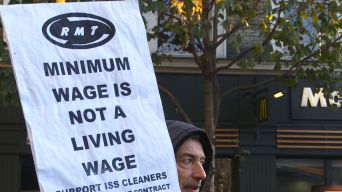
The government of the United Kingdom says that is trying to encourage people back to work and reduce dependence upon state benefits. To do this, most of the emphasis has been on reducing benefits. I believe that rather than the stick of reducing benefits, more could be achieved by the carrot of increasing the minimum wage. In turn this would reduce our benefits bill and increase our national income through Income Tax, National Insurance, Value Added Tax etc.
There are about 1,350,000 people in Britain who only receive the minimum wage with a further 4 million earning less than a “living wage” (see below). Because it is impossible to support a family on this level, a great number of these will also be receiving state benefits. It is wrong that we, as taxpayers, should be subsidising companies who fail to pay a living wage to their workers.
Advantages of increasing the minimum wage
- Dignity. Increasing the minimum wage to a living wage so that a worker does not have to apply for state benefits increases the persons self-worth and adds to their dignity.
- Benefits. Reduces the number of working people reliant on state benefits and reduces the benefit budget and therefore the deficit faced by the government and taxpayer.
- Taxation. On a 40 hour week, an individual earning the minimum wage still pays over £700 income tax per year. If the minimum wage were significantly increased there would be a huge gain for public finances in Income Tax, National Insurance and Value Added Tax.
- Subsidising Companies. Benefits paid to working people mean that the state and the taxpayer are subsidising companies.
- Justice. It is against natural justice for corporate entities to be paying less than what a man or woman is worth.
- Ethics. James make it clear in the Bible that it is wrong to exploit workers. Not paying a living wage, and expecting the government to pick up the pieces is clearly wrong.
Possible Disadvantages or problems
- Inflation. There will be a small one-off inflationary increase. This represents a cost we should pay for having a fairer system.
- Competitiveness. Some will claim that companies will be less competitive. This is not true domestically as all companies will be in the same position. Our competitiveness as a nation will hardly be affected at all because very few minimum wage jobs are in companies who export goods or services. (We have already outsourced most of our manufacturing to countries with lower labour costs.)
- Profits. Most of the costs would be passed on in price increases but most companies could afford a small reduction in profits.
A living wage
The BBC recently produced an article, Living wage could save £2bn – think tank research.
They say paying staff at least £7.45 per hour outside London, and £8.55 within the capital, would boost the nationwide income by £6.5 billion a year. But the government would collect more income tax and pay out less in benefits and tax credits.
The think tanks suggest that about £3.6 billion of the extra money paid out in higher wages under a universal living wage would go straight to the government, in the form of extra income tax and national insurance payments, along with reduced spending on benefits and tax credits for the lowest paid. As some of those workers would be in the public sector, their wages would cost the government an extra £1.3 billion. But that would still leave the Treasury with an extra net income of £2.3 billion a year.
The concept of a living wage is supported by The Living Wage Foundation. So far 140 employers have signed up but there are still millions more who could be included. Over 45,000 families have been lifted out of working poverty as a direct result. Positive benefits include enhancement of the quality of work, absenteeism reduced (by 25%), improved recruitment and retention of staff.
The Living Wage enjoys cross party support, with public backing from the Prime Minister and the Leader of the Opposition. But words are easy. There is a very good case for putting this into law by increasing the minimum wage to this sort of level.
Ethics
The following passage is not some form of communist propaganda. It is from the Bible, This is what James, an early Christian leader, had to say about exploiting our workers.
“Now listen, you rich people, weep and wail because of the misery that is coming on you.
Your wealth has rotted, and moths have eaten your clothes.
Your gold and silver are corroded. Their corrosion will testify against you and eat your flesh like fire. You have hoarded wealth in the last days.
Look! The wages you failed to pay the workers who mowed your fields are crying out against you. The cries of the harvesters have reached the ears of the Lord Almighty.
You have lived on earth in luxury and self-indulgence. You have fattened yourselves in the day of slaughter.
You have condemned and murdered the innocent one, who was not opposing you.”
(James 5:1-6 NIV)
Occupations effected by minimum wages
| Low-Paying Occupation | Number on Minimum Wage | Proportion on Minimum Wage |
| Textiles | 5,000.00 | 9% |
| Agriculture | 12,000.00 | 7% |
| Leisure | 26,000.00 | 10% |
| Non-food Processing | 30,000.00 | 9% |
| Hairdressing | 30,000.00 | 33% |
| Office work | 36,000.00 | 8% |
| Storage | 43,000.00 | 8% |
| Food processing | 45,000.00 | 14% |
| Transport | 47,000.00 | 10% |
| Childcare | 49,000.00 | 14% |
| Social Care | 52,000.00 | 7% |
| Cleaning | 206,000.00 | 24% |
| Non low-pay occupations | 246,000.00 | 1% |
| Retail | 261,000.00 | 11% |
| Hospitality | 298,000.00 | 26% |
| Total For U.K. | 1,386,000.00 | 5% |
Minimum Wage in other Countries
| Country | Min Wage | Hourly rate in pounds | Annual Rate for 40 hour week | Adjusted by Purchasing Power | ||
| Brazil | 3.91 | R$/Hour | £1.29 | £2,690 | £2,720 | |
| France | 9.43 | Euros/Hour | £8.06 | £16,810 | £15,260 | |
| Greece | 3.94 | Euros/Hour | £3.37 | £7,030 | £7,820 | |
| Korea (South) | 4860 | Won/Hour | £2.80 | £5,840 | £9,000 | |
| Poland | 3.65 | Euros/Hour | £3.12 | £6,510 | £11,240 | |
| Spain | 4.34 | Euros/Hour | £3.71 | £7,740 | £8,490 | |
| United Kingdom | 6.19 | Pounds/hour | £6.19 | £12,910 | £12,910 | |
| United States | 7.25 | Dollars/hour | £4.74 | £9,890 | £10,850 |
This article is primarily about the United Kingdom. The table above shows the minimum wage in a few countries.
- The rates are converted to pounds as at the publication date for this article.
- The annual rate assumes a 40 hour week.
- Because prices are different in other countries, the last column shows an adjustment to be able to make direct comparisons.
- The rate in the U.K. has just been increased to £6.31 which is effectively a cut as the increase is below inflation.
Conclusion
Justice, logic and economics all agree. The minimum wage should be increased so that taxpayers do not subsidise companies. All would ultimately benefit: the low-paid, the the companies who pay them and the taxpayer who subsidise the companies. Dignity will be restored, justice will be improved and we would all feel better by doing what is right.
Finding the right level is complicated by I suggest that the minimum wage should be increased to at least £8 an hour with immediate effect. I know we are in difficult economic times, but this might, just might, provide a way out.
Related articles
- Minimum wage to rise but 1% hike for young falls behind inflation (guardian.co.uk)
- National minimum wage to increase by 12p an hour from October (independent.co.uk)
- Employers should consider ‘going beyond’ minimum wage (itv.com)
- Minimum wage should be substantially raised, not cut (blogs.telegraph.co.uk)
- The minimum wage has been cut, not increased (newstatesman.com)

I quite agree – allowing corporations to pay people so little that their wages have to be topped up substantially by the taxpayer is immoral. It is time for an increase, though what to, I don’t know – the BBC’s recommendations sounded fair, but I suspect that £7.45 may go somewhat further up North than it would in Aldershot.
LikeLike
Great article – well researched, George. I don’t think there can be a right answer, though, even if we all had perfect love and were completely unselfish.
While I’m sure there are large corporations taking advantage of the artificial minimum which the minimum wage imposes, if I were (still) an employer in a smaller company I might consider employing an extra person at the current minimum wage, but not want the additional risk of employing someone at a higher rate.
I’m sure that many smaller companies would dispute your assertion that “most companies could afford a small reduction in profits”. In many cases it is more about the survival of the company (and therefore survival of the livelihood of the staff). There are many companies who consciously and conscientiously put people – including staff – first. For them, I’d have to say that the verses quoted aren’t all that helpful.
One other thing to illustrate the difficulty of making right decisions here is the France example. Yes, their minimum wage is higher, but, in my view, their current policies are not sustainable and they could easily become another European basket case before too long, causing significant detriment to the lowest paid workers who would be the first to be sacked.
LikeLike